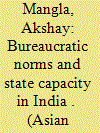|
|
|
Sort Order |
|
|
|
Items / Page
|
|
|
|
|
|
|
| Srl | Item |
| 1 |
ID:
142598


|
|
|
|
|
| Summary/Abstract |
Himachal Pradesh outperforms other Indian states in implementing universal primary education. Through comparative field research, this article finds that bureaucratic norms—unwritten rules that guide public officials—influence how well state agencies deliver services for the poor. The findings call attention to the informal, everyday practices that generate state capacity.
|
|
|
|
|
|
|
|
|
|
|
|
|
|
|
|
| 2 |
ID:
090901


|
|
|
|
|
| Publication |
2009.
|
| Summary/Abstract |
Private, voluntary compliance programs, promoted by global corporations and nongovernmental organizations alike, have produced only modest and uneven improvements in working conditions and labor rights in most global supply chains. Through a detailed study of a major global apparel company and its suppliers, this article argues that this compliance model rests on misguided theoretical and empirical assumptions concerning the power of multinational corporations in global supply chains, the role information (derived from factory audits) plays in shaping the behavior of key actors (e.g., global brands, transnational activist networks, suppliers, purchasing agents, etc.) in these production networks, and the appropriate incentives required to change behavior and promote improvements in labor standards in these emergent centers of global production. The authors argue that it is precisely these faulty assumptions and the way they have come to shape various labor compliance initiatives throughout the world-even more than a lack of commitment, resources, or transparency by global brands and their suppliers to these programs-that explain why this compliance-focused model of private voluntary regulation has not succeeded. In contrast, this article documents that a more commitment-oriented approach to improving labor standards coexists and, in many of the same factories, complements the traditional compliance model. This commitment-oriented approach, based on joint problem solving, information exchange, and the diffusion of best practices, is often obscured by the debates over traditional compliance programs but exists in myriad factories throughout the world and has led to sustained improvements in working conditions and labor rights at these workplaces.
|
|
|
|
|
|
|
|
|
|
|
|
|
|
|
|
|
|
|
|
|